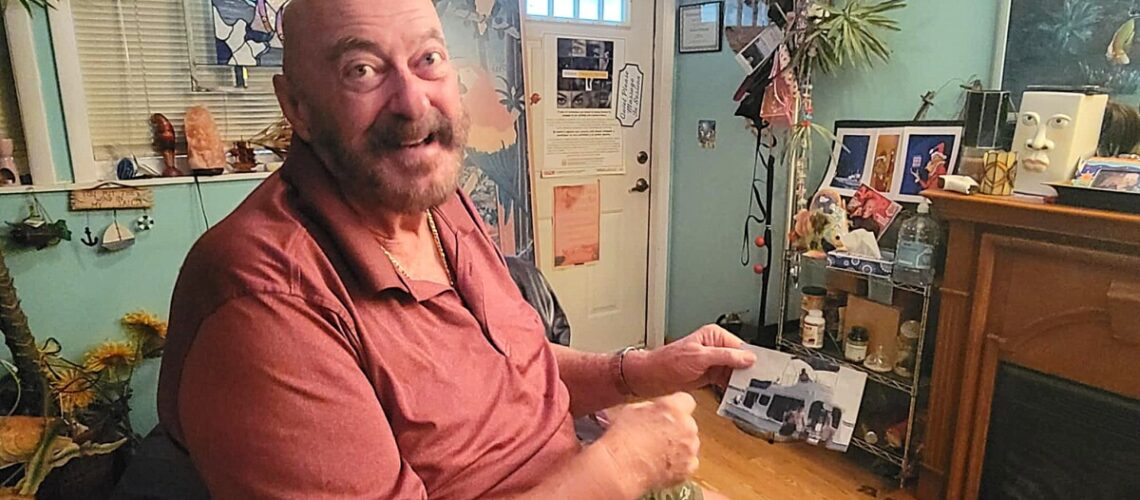Central Florida homeowners join rising trend, opting out of property insurance
January 12, 2025

- HSBC to Sell French Life Insurance Arm, Focus on Profitable Operations
- Emerging Greenhouse Risk and Insurance Trends for 2025
- Consumer connection: What is insurance fraud? | News, Sports, Jobs
- What to do if you lost your home, business in the fires; how to file insurance claim
- Opinion | Americans Are Angry About Their Health Insurance—With Good Reason
Longtime Melbourne resident David Schroeder Sr. is holding a photo of his old boat, Life of Riley — a 28-foot Adventure Craft mini yacht.
“It’s like a little houseboat. Every time I’d go out there in the river, everybody had a fit over it,” he said.
Schroeder lost his water-cruising vessel in 2017, the same way many other Floridians lose property — through storm damage. He shared this story as a heavy thunderstorm brings wind and rain to his neighborhood, much like the storm that destroyed his boat years ago.
“A hurricane and tornadoes had come through down to Pelican Harbor Marina; right here, off U.S. 1,” the 74-year-old recalled. “The tornado came right across and sunk my boat.”
Luckily, Schroeter’s boat was insured, and he got back exactly what he had paid for the boat. Sad as it was to see it go, he said that, at least, he didn’t take a huge loss.
But when it comes to his house, Schroeter has taken a different approach: He opted out of insuring the home he’s owned and lived in for more than 40 years.
“There’s never been any damage done to it, and I said, you know, since the house has been built, there’s never been a claim. And think of all that money that’s been wasted,” he said.
The house was built in the 50s. He inherited it after his mother died in the 80s, so he’s always owned it outright. Without a mortgage lender to require insurance on the property, he’s been free to choose whether he wants coverage or not.
He made the decision to forego homeowners insurance about six years after Florida’s 2004 Hurricane season, when four back-to-back hurricanes made landfall in just a couple of months, recording the most ever for any state in a single year.
Even though his house made it through that season unscathed, Schroeter said, his private insurer hiked up prices by hundreds of dollars annually, while offering less coverage each time his policy renewed. Eventually, the company dropped him altogether, and he had no choice but to go to Citizens Property Insurance Corporation — the state-backed insurer for people no longer able to get insured in the private market.
However, insurance through Citizens also grew more unaffordable every year. He became frustrated and decided he didn’t need it.
“Insurance is nothing but a game — I’m going to use it, or they’re going to use it. So I just said, ‘Fine, I’m not going to have insurance,’” he said.
Schroeter’s story reflects that of at least hundreds of thousands other people in the state. He canceled his last insurance policy in 2010 and has never looked back, joining a rising trend of Florida homeowners also foregoing insurance.
“Right now, 20 percent of homeowners in Florida have opted to self insure and remain uninsured,” said Divya Sangam, an insurance expert and spokeswoman with ValuePenguin, a Lending Tree research site that conducted a data analysis of the Florida insurance crisis.
The report stated that about 1 out of 5 Florida homeowners don’t have insurance of any kind. If any of these self-insured homes suffer damages, homeowners might have to pay to repair or replace their own homes.
Homeowners who don’t have a mortgage on their properties, have their houses paid off, are under no obligation to insure their homes. The Florida Association of Realtors reported last year the number of homes in Florida that are owned outright is nearly 30 percent, higher than the national average, which is closer to 28%.
“This is very risky, but a huge part of this is in response to their very limited and very expensive options for homeowners insurance,” Sangam said.
Propelled by a crisis
Florida currently has the most expensive insurance premiums in the nation. According to data by Insurify, a national insurance data collection group, Florida’s projected cost of property insurance averages about $11,000 a year.
ValuePenguin’s study shows Florida’s property insurance has increased 72% in the last five years, with the number of homeowners who can’t get coverage through private insurers going up 400%.
That’s why millions of people have turned to Citizens, a state-run and funded company established by the Florida Legislature in the 90s. After the destruction from Hurricane Andrew in 1992, many private insurers went belly up, while others left the state altogether.
Citizens was created to fill in the gap, as a “last resort” for homeowners who can’t purchase insurance policies through traditional means. And yet, it’s become the largest holder of policies in Florida, peaking at 1.4 million accounts in the fall of 2023 — one year after Hurricane Ian’s destruction mirrored post-Andrew market chaos. The storm, which would be the most costly in state history, drove more than 30 insurance companies out of Florida.
The companies that stayed hiked up premiums while they lowered coverage or even dropped their riskiest homes, reducing their exposure. This left millions across the state flocking to Citizens, a company that denied more than half its claims last year. Insurers in Florida, private or otherwise, deny more claims than in any other state.
“When you take all of this in context, you’re going to end up with a lot of homeowners thinking, ‘I’m not paying so much for insurance anymore. Nothing has ever happened to my house. I’m just going to take the risk and go uninsured until they fix the insurance problem in the state,” Sangam said.
Mark Friedlander, director of corporate communications at the Insurance Information Institute, said the state is working on that problem. Lawmakers have spent the last two years passing meaningful and effective insurance reforms to help make the market more attractive to private insurers and give consumers more protections.
“The industry is in a very strong financial position, the best in more than a decade. We expect stability to continue in 2025,” Friedlander said.
Florida’s Office of Insurance Regulation touted some of these policies include limiting policyholders from taking up litigation against their private insurance companies, ensuring that insurance companies can’t abuse the appraisal process, and launching a depopulation program for Citizens — switching hundreds of thousands of customers back to the private market.
The OIR also reported a brighter year ahead for the state’s insurance market.
Last year, Florida welcomed at least eight new private insurers and more are joining in 2025, according to Friedlander. He said this will give homeowners more options and hopefully keep them from joining the self-insuring trend.
A risky choice
Most people who self-insure are lower income families, although the practice is not exclusive to them — some wealthy Florida homeowners forego insurance if they feel financially comfortable in the event of an emergency.
Friedlander said that repairs on a home are one thing but having to replace it is another, which can cost hundreds of thousands. Unless a homeowner is very wealthy, he said, self-insuring is just unrealistic and dangerous.
“We have seen so many homeowners in the past few years that decided to self insure and regret it to the point where they cannot rebuild their homes and have to move. It’s a bad road to go down. In most cases, if you make that decision, you’re going to regret it for the rest of your life,” he said.
Back in Melbourne, Schroeter is one of those not-wealthy individuals taking a chance. He still works, self-employed as a licensed medical massage therapist, but as he gets older, he’s unable to do as much as he once could. Money isn’t quite rolling in.
Under the heavy rain and the cracking of lightning directly above his home, Schroeter said he supports those making the same choice as he did. The way he sees it, foregoing home insurance has paid for itself. The only major expense he’s had on his home was a maintenance repair, installing a new roof in 2014.
“That sets me up for another 50 years or so,” he said. “So, I’m good.”
For him, it’s been an easy decision, but he said he’s aware of the risk he’s taking.
“Well, it’s a chance, like I said, and I’m gambling. But life is a chance, anyway. I could walk out this door and get hit by a car right in the middle of the street. Lightning could hit my house any minute. But you have to have faith and trust. And I know that I am blessed,” Schroeter said. “It’s all in God’s hands.”
Lillian Hernández Carballo is a Report for America corps member.
Copyright 2025 Central Florida Public Media
Bạn đang xem: Central Florida homeowners join rising trend, opting out of property insurance
Nguồn: https://propertytax.pics
Danh mục: News
